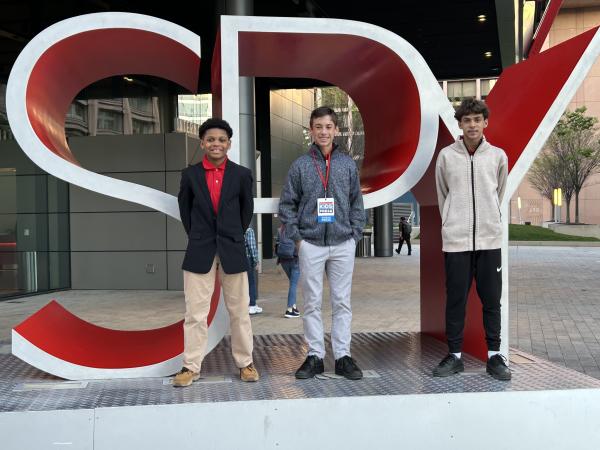KID REPORTERS’ NOTEBOOK
Solution Seekers Enter the National STEM Challenge
The STEM Challenge encouraged students to cultivate their knowledge of STEM in order to create more sustainable ways of living.
Editor’s note: Kid Reporter Logan Gracey, who is the author’s twin brother, contributed reporting to this article.
The first-ever National STEM Festival took place from April 11 - 13 in Washington, D.C. The festival was the culmination of a National STEM Challenge that began at the start of the past school year, in 2023. Students in grades 6 through 12 throughout the country and in U.S. territories were invited to pursue environmentally-minded projects that drew upon their knowledge of STEM (Science, Technology, Engineering, and Math).
The U.S. Department of Education, in partnership with EXPLR, an online learning company, hosted the Festival. EXPLR created the Challenge as a way to engage young people in STEM research. Winners and finalists of the Challenge were invited to Washington, D.C., to demonstrate their knowledge and celebrate their success.
Students were tasked with designing projects that tackle real-world challenges, including environmental stewardship, health and medicine, and space innovation.

Scholastic Kid Reporters Xander Dorsey (left), Gavin Gracey (center), and Logan Gracey (right) covered the first-ever National STEM Festival at the International Spy Museum in Washington, D.C.
“SOLUTION SEEKERS”
More than 2,000 students nationwide submitted projects. More than 100 top participants were then invited to present their projects in Washington D.C.
Before the April 13 celebration at the International Spy Museum, my brother, Kid Reporter Logan Gracey, and I spoke with two co-founders of the Challenge. Jenny Buccos is the founder and chief executive officer of EXPLR. Kari Byron is the founder and global vice president of production of the company, which creates multimedia STEM programs. According to Buccos, the Challenge projects showcased in D.C. were chosen for having “a positive impact on people, the planet, or your community.” She described students who participated in the Challenge as “solution seekers.”
Bryon, who is known for her role as the host of MythBusters, a science series on the Discovery Channel, said that “anyone can do science.” She was grateful to the students who shared their knowledge. “Science is for everybody,” she added.
As we walked from project to project, we met young people who had found ways to solve sustainability issues confronting our generation. One student created a microbial fuel cell, a machine that can simultaneously purify water and generate electricity. Megan Reyna Yeager from Maryland showed that carbon has a special property called absorption, and that substances like coffee grounds can help to absorb dangerous methane gas from the atmosphere.
Even the judges were impressed with the students’ work. As Andrew Zimmern, a chef who served as a judge, told a food reporter: “These aren’t future changemakers. They are changing our world right now. And we are bringing them to the world, front and center.”
To learn more, read this article by Kid Reporter Xander Dorsey, who also covered the Festival.
At the Festival, some STEM projects, including this one, explored ways to help endangered animal populations.
